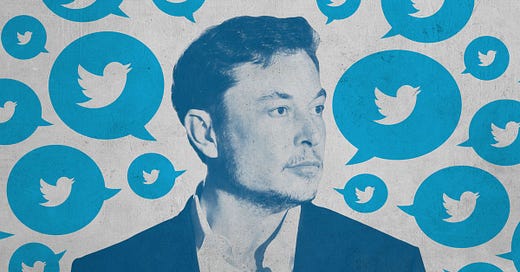This piece was written in my capacity as the Free Speech Union’s Communications Officer. The Free Speech Union exists to protect those who’ve been cancelled, harassed, sacked or penalised for exercising their legal right to free speech whether in the workplace or the public square. Please take a look at the great work the organisation does - our Twitter account is here.
Self-styled “free-speech absolutist” Elon Musk has mooted the possibility of funding legal bills for any users of X that are “treated unfairly” by employers due to their activity on the platform, and suggested that in such cases he “will go after the boards of directors of the companies too”.
Mr Musk has been vocal about his commitment to freedom of speech in the past, and shortly after acquiring Twitter, tweeted: “Free speech is the bedrock of a functioning democracy, and Twitter is the digital town square where matters vital to the future of humanity are debated.”
Over the weekend, however, he went further, firing a shot across the bows of censorious employers who claim the right to police the lawful speech of employees outside the workplace, tweeting: “If you were unfairly treated by your employer due to posting or liking something on this platform, we will fund your legal bill,” adding that there will be “no limits” to the bills he’s prepared to fund.
Reacting to the announcement on GB News, FSU General Secretary Toby Young said it was a potential “game-changer”, but did also caution that we would need to see the details of Musk’s proposal before anyone from the FSU’s legal team gets to work dictating the terms of surrender for the massing forces of cancel culture.
We know of course that Mr Musk looks askance at any form of censorship that goes beyond the law, which suggests X Corp’s legal team may already have a well-defined understanding of what it believes constitutes “unfair treatment”.
But does he intend to apply his nascent policy to X from this point forth, or will it be applied retrospectively to cover the period since April 2022, when he bought the platform, then known as Twitter?
Is his legal commitment to service users to be applied outside the jurisdiction of the United States, where X is headquartered?
And what about cases like those of FSU members Gillian Philip and Sibyl Ruth, where firms employ workers on precarious contracts, and then label them as ‘independent contractors’ rather than ‘employees’?
These details aside, the very fact that Musk has intimated a desire to legally defend the free speech rights of X’s users will no doubt already have given company directors across the western world pause for thought.
Allowing your firm’s uber woke, maliciously progressive Head of HR a certain ‘artistic licence’ on the disciplinary front is all well and good when it comes to bullying dissenting members of staff who you know can’t possibly afford to take you to an Employment Tribunal (the barrister and co-founder of the LGB Alliance Allison Bailey had to raise more than £500,000 to fund her recent legal case, for example).
But in circumstances where the second richest man in the world suddenly steps into the fray on the side of employees who’ve been treated unfairly for expressing perfectly lawful beliefs and starts threatening to spray fifty-pound notes like a fountain, it would be entirely understandable if board members began to question whether having activist employees congratulate them for remaining “on the right side of history” is necessarily always as important as running a business that remains “on the credit side of the ledger”.
The FSU sees an enormous number of cases of employees being punished for something perfectly lawful that they’ve said on social media, and usually on X.
This can include recently posted comments, or even comments that have been dredged up by ‘offence archaeologists’ in a targeted attempt to harm someone’s reputation – as happened, for example, in the recent, high profile cases of the then leader of Northern Ireland’s UUP Party, Doug Beattie (Telegraph), schoolteacher Christian Webb (Spiked), American comedian Kevin Hart (Spectator), and current FSU case Karen Sunderland (iNews).
If Elon makes good on this offer, it could be a real wake-up call to HR departments. You only have to look through our case files to see that at present, they are massively overestimating what constitutes an employer’s business.
The fact is that a huge amount of what happens on X has got nothing to do with a person’s job, or the contractually defined employment relationship they’ve entered into, and won’t feasibly harm an employer’s brand or reputation.
As the FSU’s Chief Legal Counsel Bryn Harris pointed out on GB News this week, that needs to be the test – did the post in question actually harm the employer – but too often HR investigation teams make moral, normative (and, yes, deeply political) judgements about what employees should and should not say outside the workplace.





Elon Musk is a front man for the globalists. I still can't post on Twitter. So much for his pushing of "Free Speech". Some have labelled him "controlled opposition". That is too kind. He is the opposition.